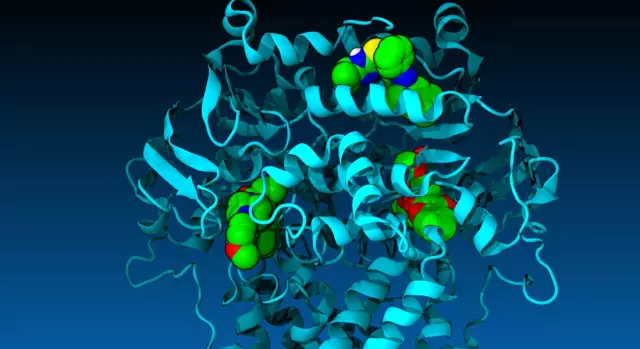- Author Rachel Wainwright wainwright@abchealthonline.com.
- Public 2023-12-15 07:39.
- Last modified 2025-11-02 20:14.
Finnish oncologists start treating prostate cancer with new drug Lu-177-PSMA
In 2017, Finnish oncologists began treating metastatic prostate cancer with the radionuclide drug Lu-177-PSMA. The radioactive drug penetrates into prostate cancer cells regardless of their location and irradiates cancer cells even with multiple metastases. This treatment provides new options for treating patients with advanced prostate cancer.

New opportunities in the treatment of metastatic prostate cancer
Prostate cancer is the most common cancer in men. More than 400,000 cases * are diagnosed worldwide each year. In most cases, we are talking about localized prostate cancer. Such a diagnosis can now be completely cured. With metastatic prostate cancer, as a rule, there is no talk of recovery; in such cases, patients require constant therapy.
Several years ago, the arsenal of methods for treating advanced prostate cancer was supplemented by treatment with the radionuclide drug Lu-177-PSMA (Lutetium-177-PSMA). The effect of the drug is radiation, which destroys prostate cancer cells. The drug attacks cancer cells, regardless of their location, and can be used in multiple metastases.
Today, Lu-177-PSMA is being treated in Austria, Germany, Australia and Finland. This type of treatment is beginning to be used in America.
In Finland, the first Lu-177-PSMA treatment was performed in January 2017 at the Docrates Cancer Clinic. The clinic was the first to provide this type of treatment in the Nordic countries. The treatment is carried out under the guidance of the chief physician of the radioisotope department of the Docrates clinic, Professor Kalevi Kairemo.
The publication of a new study by the European Journal of Nuclear Medicine and Molecular Imaging (the research team includes Kalevi Kairemo and the head physician of the Docrates Clinic Timo Joensuu) shows a positive response to treatment in 44% of patients. For comparison, with the so-called. the third line of chemotherapy, a positive response to treatment is observed in only 22% of patients.
- In January 2018, one of our patients from Sweden finished treatment. At the time of the patient's visit, the prostate cancer had already spread to the spine, skull and lymph nodes. The situation was hopeless, before starting Lu-177-PSMA therapy, I explained to the patient that we could not promise anything. In this particular case, the patient underwent 6 courses. Only after the third therapy, the cancer cells were destroyed so much that the effectiveness of the treatment became noticeable in the diagnostic images, says Professor Kalevi Kairemo, chief physician of the radioisotope department of the Docrates clinic.
- In February 2018, the patient underwent a control PET-CT scan with the PSMA isotope, and it was clearly visible in the images that the cancerous foci in the bone tissue were gone. Not all cancer cells have disappeared from the patient's body, but reducing their number from a trillion to hundreds is a great result. I would like to emphasize that we are not talking about some kind of miraculous treatment. This type of therapy is indicated only for metastatic prostate cancer, concludes Kalevi Kairemo.
Text of the Dokrates clinic (translated from Finnish)
Contact information for specialists: This email address is being protected from spambots. You need JavaScript enabled to view it. marked "Lu-177-PSMA" (in Russian)
Patient contact information: This email address is being protected from spambots. You need JavaScript enabled to view it., +358505001899 (in Russian)
www.docrates.com
* source of statistics:
Found a mistake in the text? Select it and press Ctrl + Enter.






